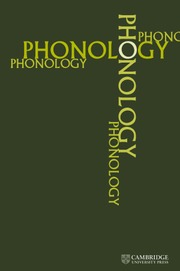April McMahon (2000). Change, chance, and optimality. Oxford: Oxford University Press. Pp. x+201.
Published online by Cambridge University Press: 15 August 2002
Abstract
It is generally acknowledged, by both its proponents and detractors, that Optimality Theory has provoked a reexamination, in recent years, of the role of functional considerations, and their typological reflexes, in phonological theory. April McMahon's Change, chance, and optimality attempts an in-depth examination of this issue, particularly from the perspective of the relation between synchrony and diachrony in linguistic theory. The issue, and OT's general stance towards it, are summarised by Prince & Smolensky (1993: 198):
One might feel compelled to view a grammar as a more-or-less arbitrary assortment of formal rules, where the principles that the rules subserve (the ‘laws’) are placed entirely outside the grammar, beyond the purview of formal or theoretical analysis, inert but admired. It is not unheard of to conduct phonology in this fashion. We urge a reassessment of this essentially formalist position. If phonology is separated from the principles of well-formedness (the ‘laws’) that drive it, the resulting loss of constraint and theoretical depth will mark as major defeat for the enterprise. The danger, therefore, lies in the other direction: clinging to a conception of Universal Grammar as little more than a loose organizing framework for grammars. A much stronger stance, in accord with the thrust of recent work, is available. When the scalar and the gradient are recognized and brought within the purview of theory, Universal Grammar can supply the very substance from which grammars are built: a set of highly general constraints which, through ranking, interact to produce the elaborate particularity of individual languages.
- Type
- Review Article
- Information
- Copyright
- © 2001 Cambridge University Press
- 2
- Cited by


